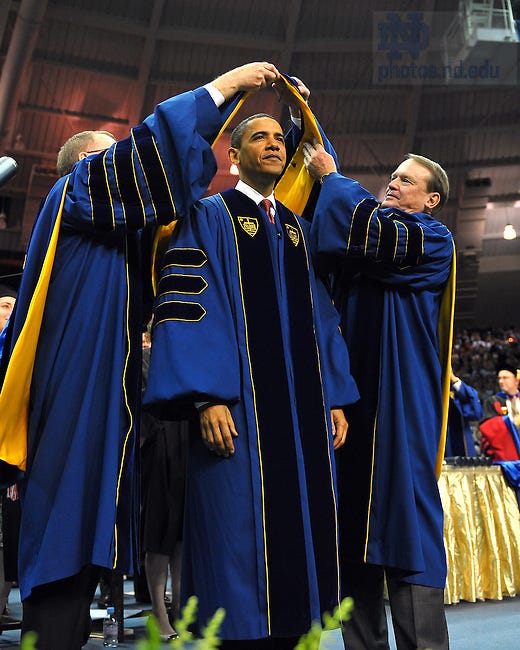Notre Dame Passes
Patrick Deneen examines why Notre Dame chose not to invite President Trump or Vice President Vance to be Commencement Speaker.
The National Catholic Register has just reported that neither President Trump nor Vice President Vance will be the University of Notre Dame’s Commencement speaker at this May’s graduation ceremony. While it isn’t known whether the university invited either to deliver the address, given the university’s track record in recent years, it seems unlikely. The university has sought to avoid “platforming” any of the more “populist” figures prominent in American politics today, avoiding even major Catholic political figures who stand outside what it deems to be the “mainstream.”
Here are some of the major political figures who have been invited by the university president’s office to speak at the Notre Dame in various capacities in recent years (with recognition that these invitations came under the previous president, Fr. John Jenkins):
Joe Biden and John Boehner (2016)
Mike Pence (2017)
Chris Coons & Todd Young (2023)
Condoleeza Rice (2024)
Whatever their differences, what is readily apparent is that these individuals were invited by the president’s office in order (as much as possible) to avoid offense and to loudly proclaim Notre Dame’s commitment to the consensus “mainstream.” They are especially noteworthy for being far from the contemporary cutting edge of politics, and hence uniformly uninteresting. Even Joe Biden, soon to be president, was invited not for any special relevance of his own, but paired with John Boehner out of the motive to signal Notre Dame’s commitment to “civility.” Even then, no one was really all that interested in hearing from “Sleepy Joe,” but only to present him as a relic of supposedly halcyon days of bipartisanship.
Notre Dame is always fearful of irrelevance because of its location in a rust belt city surrounded by the cornfields in the middle of so-called flyover country. With its nearly $20 billion endowment, it works diligently at minimizing this geographic disadvantage relative to its “aspirational peers” in the East.
But since the 2016 election, Notre Dame’s political marginality isn’t due to geography. Rather, its irrelevance arises from self-imposed, supposedly respectable refusal to recognize, address, and engage with the political “signs of the times.”
Notre Dame—a microcosm of American Catholicism—aptly demonstrates that Catholic institutions in America will likely be the last outposts to give serious consideration of non- and postliberal political possibilities, because—like most Catholic institutions—since its inception, it has craved to attain respectability within acceptable opinion of dominantly Protestant America. Ironically, it will remain liberal long after mainstream (largely post-Protestant) institutions start engaging in serious postliberal inquiry.
Who is missing from the list of recent, sanctioned invitees reveals as much as the list of who passes muster. The palpable desperation of the institution to keep the discussion of politics limited to a narrow and increasingly disconnected bandwith is a remarkable testimony to a stubborn if intellectually numb fealty to a dead consensus.


